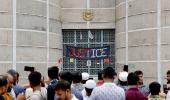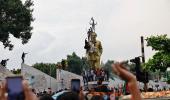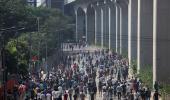Bangladesh President Mohammed Shahabuddin dissolved Parliament on Tuesday and appointed Nobel laureate Mohammad Yunus as the head of an interim government, a day after Prime Minister Sheikh Hasina abruptly resigned and fled the country following weeks of violent protests.

The decision was made in a meeting President Shahabuddin had with chiefs of the three services and a 13-member delegation of the Anti-Discrimination Student Movement at Bangabhaban (presidential palace), President's Press Secretary Md. Joynal Abedin said late Tuesday night.
The other members of the interim government will be finalised after consultations with various political parties, the president's press secretary said.
While the Army took charge on Monday, incidents of violence were reported overnight in many parts of the country and the death toll due to the unrest since mid-July rose to 440.
A number of Hindu temples, households and businesses were vandalised, women assaulted and at least two Hindu leaders affiliated with the Awami League party headed by Hasina were killed in the violence in Bangladesh after she fled the country, according to two community leaders in Dhaka.
The Anti-Discrimination Student Movement that spearheaded the massive protests has earlier said that 84-year-old Yunus had agreed to head the interim government.
Yunus is currently out of the country but welcomed the ouster of Sheikh Hasina's regime, describing the development as the 'second liberation" of the country.
Yunus won the Nobel Peace Prize in 2006 for his anti-poverty campaign through the Grameen Bank, a model replicated across continents.
Hasina landed at the Hindon airbase, near Delhi, on Monday in a Bangladesh military aircraft and is unlikely to move out of India for the next couple of days, people familiar with the matter said in New Delhi. She has been shifted to an unspecified location under tight security, they said.
With army and police personnel patrolling the streets, the situation in Dhaka was largely calm on Tuesday, local media reported.
Buses and other public transport were on the streets and traders were opening shops. Government vehicles were heading to offices. Many battery-run rickshaws plied the roads, it added.
According to local media, 100 more deaths in the Monday violence were reported taking the toll to 440.
"The death toll(in the violence) stood at 440 in 21 days from July 16 to yesterday," the Prothom Alo said.
The President's move to dissolve Parliament has cleared the way for fresh elections, just months after the January polls which brought Hasina to power again for the fourth consecutive term. The opposition had then boycotted the polls.
"The President dissolved the Jatiya Sangsad (Parliament) under an executive order," a Bangabhaban spokesman told PTI.
"The decision to dissolve the Parliament was taken following the President's discussions with chiefs of three staff of armed forces, leaders of different political parties, representatives of civil society and leaders of the Anti-Discrimination Student Movement," said a statement issued by the President's office, even as a major reshuffle was carried out in the top positions in the Army.
In a video posted on social media early Tuesday, Nahid Islam, one of the key coordinators of the student movement, proposed Yunus as the head of the interim government.
He said they have already talked with Yunus, who has agreed to take the "responsibility to save Bangladesh".
"No government other than the one proposed by the students will be accepted. As we have said, no military government, or one backed by the military, or a government of fascists, will be accepted," said Nahid, flanked by two other coordinators.
Yunus has agreed to lead the interim government as its chief adviser, the Daily Star reported, citing a source.
"If the students can sacrifice so much, if the people of the country can sacrifice so much, then I also have some responsibility. Then I told the students that I can take the responsibility," Yunus said.
Yunus had been locked in a protracted row with the Hasina government due to obscure reasons while authorities initiated a series of investigations against him after she came to power in 2008. He was charged under dozens of cases. In January, Yunus was sentenced to six months in jail by a court on charges of labour law violation.
Meanwhile, Bangladesh Nationalist Party chief and ex-premier Khaleda Zia was released from house arrest, according to the Presidential spokesman.
The 79-year-old former prime minister has long battled various ailments, including issues related to the kidney, lung and heart.
The process to free those arrested Since July 1 has started, and many have already been released, he added.
Fresh clashes between protesters demanding Hasina's resignation over the quota system in government jobs and the ruling Awami League supporters in different parts of Bangladesh erupted on Sunday days after more than 200 people were killed in violent clashes between police and mostly student protesters in July.
At least 24 people were burnt alive last night in a hotel owned by a leader of the Awami League in the western Joshor district, hospital sources said.
The educational institutions were reopened on Tuesday following a long period of closure due to violence surrounding the student movement. However, the educational institutions in Dhaka saw low attendance, the Dhaka Tribune newspaper reported.
Attendance in the ministry offices was significantly low, and ministers and Members of Parliament were notably absent. Those who did come to work were filled with fear and anxiety, it added.
Army members also were seen on duty alongside police officers at the home ministry office.










